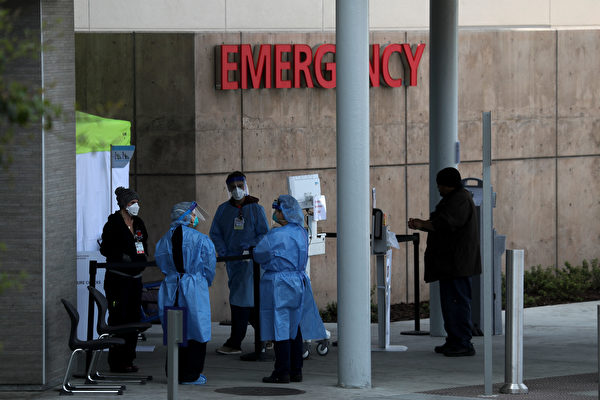Research, editing : Gan Yung Chyan, KUCINTA SETIA
News on disease control, CCP, U.S.
News (1) to (3) / Reporter : Lin Yan / https://www.epochtimes.com/gb/23/12/2/n14128649.htm
News (1)
U.S. emergency room doctors worry about Beijing avoiding sensitive issue of mysterious pneumonia
Image : The picture shows that on 26 March 2020, staff at a hospital in California screened people entering the emergency room. (Justin Sullivan/Getty Images)

An American emergency room doctor is worried that the WHO and Beijing are avoiding certain key issues on the mysterious pneumonia in Chinese children. He said, "Something is strange in China, something that doesn’t quite make sense.”
Dr. John Campbell, an American emergency room physician and lecturer, recently talked on his channel program about the "mysterious wave of pneumonia" prevalent among Chinese children, raising concerns about whether a new pandemic is occurring.
He said that judging from the available information, although the answer seems to be no, it also shows that "some strange things are happening in China, which are not reasonable."
Campbell particularly pointed out that Chinese Communist Party officials and the World Health Organization (WHO) gave strange answers to questions about what caused the surge in respiratory infections among Chinese children and whether the symptoms were typical.
The China CDC and WHO reported a surge in respiratory infections among children in northern China. Official Chinese reports said 3,500 children were hospitalized in October and November. However, most Chinese media, including Western media, conducted on-the-spot investigations into children’s hospitals in Beijing and found that they were overcrowded and even received thousands of emergency calls a day.
Campbell said it was clear these clusters needed an explanation.
Given China's three-year COVID-19 clearance lockdown, the timing and intensity of such mandatory measures would create a certain rebound in respiratory infections in children, as children who were isolated during lockdowns in the past were not exposed to the typical number of pathogens , thus repaying the “community immunity debt”.
The Chinese authorities and the WHO use this as the basis for drawing reasonable conclusions. They are also trying to inform the public that respiratory illnesses in China are normal.
However, Campbell analyzed that there are some unusual aspects to this surge, including the first time that Chinese authorities reported the existence of Mycoplasma pneumoniae infection. Mycoplasma is an unusual, simple, small bacterium that causes SARS in some children and adults.
Local reports indicate that mycoplasma pneumonia manifests as lung inflammation and high fever, but no cough. The absence of a cough is not consistent with pneumonia or a mycoplasma infection, Campbell said.
He added that usually only 5 to 10% of people infected with mycoplasma will develop pneumonia. The emergence of a large number of pneumonia patients suggests that infection leads to a higher proportion of pneumonia, or that mycoplasma bacterial infections are very common in China.
The WHO has asked Chinese health authorities to provide relevant laboratory results and data trends.
News (2)
The CCP’s secrecy may silence the WHO on key issues
Campbell said mycoplasma does affect the lungs, but often results in walking pneumonia, which can usually be treated with antibiotics and does not require hospitalization.
Mycoplasma spreads slowly within families and is usually a disease of young people, he said, but this outbreak appears to be worse than generally expected.
Bacterial pneumonia often follows a viral infection, he said, so some questions need to be asked, "Is there a common virus here that makes people susceptible to bacterial infection? Could this be a new virus?"
He said current data from CCP China suggested greater vulnerability to infection after contracting the virus, but there was not enough data to back it up yet. Therefore, the above doubts are possible, but there is no evidence of new viral or bacterial infections.
"What we (will be) dealing with is potentially dangerous microplasma antibiotic resistance," Campbell said.
He said that past studies in Beijing have shown that local people's bacterial resistance to mycoplasma pneumonia ranges from 70 to 90%, and mycoplasma infections are usually treated with antibiotics.
Campbell said if the condition spread globally, patients would face troublesome challenges.
Even multidrug-resistant mycoplasma does not change the transmission characteristics or pathogenicity of the bacteria, he said. But if a disease is not easily treatable with antibiotics, there will be more viruses around, meaning transmission is more likely.
"Why the Chinese authorities and the WHO don't want to discuss a simple issue like bacterial resistance is difficult for the outside world to know, but there is a culture of secrecy in some departments in China, so it is not surprising." Campbell concluded.
News (3)
Concerned about WHO’s statement on Beijing that “all comers are welcome”
"One of the things that really worries me is the WHO saying they are doing this under the terms of the International Health Regulations (IHR)," Campbell said.
Campbell said the CCP said they have always complied with the International Health Regulations 100%, and that no matter what Beijing says, the WHO "seems to accept everyone who comes."
"Can we expect more scrutiny and more stringency from the WHO?" he asked worriedly.
It is a consensus within the industry that China’s medical statistics are very unreliable, especially during COVID-19, when the officially reported death toll is seriously low. Some scholars estimate that the death rate officially reported by the CCP is 800 times lower than that of the United States.



No comments:
Post a Comment